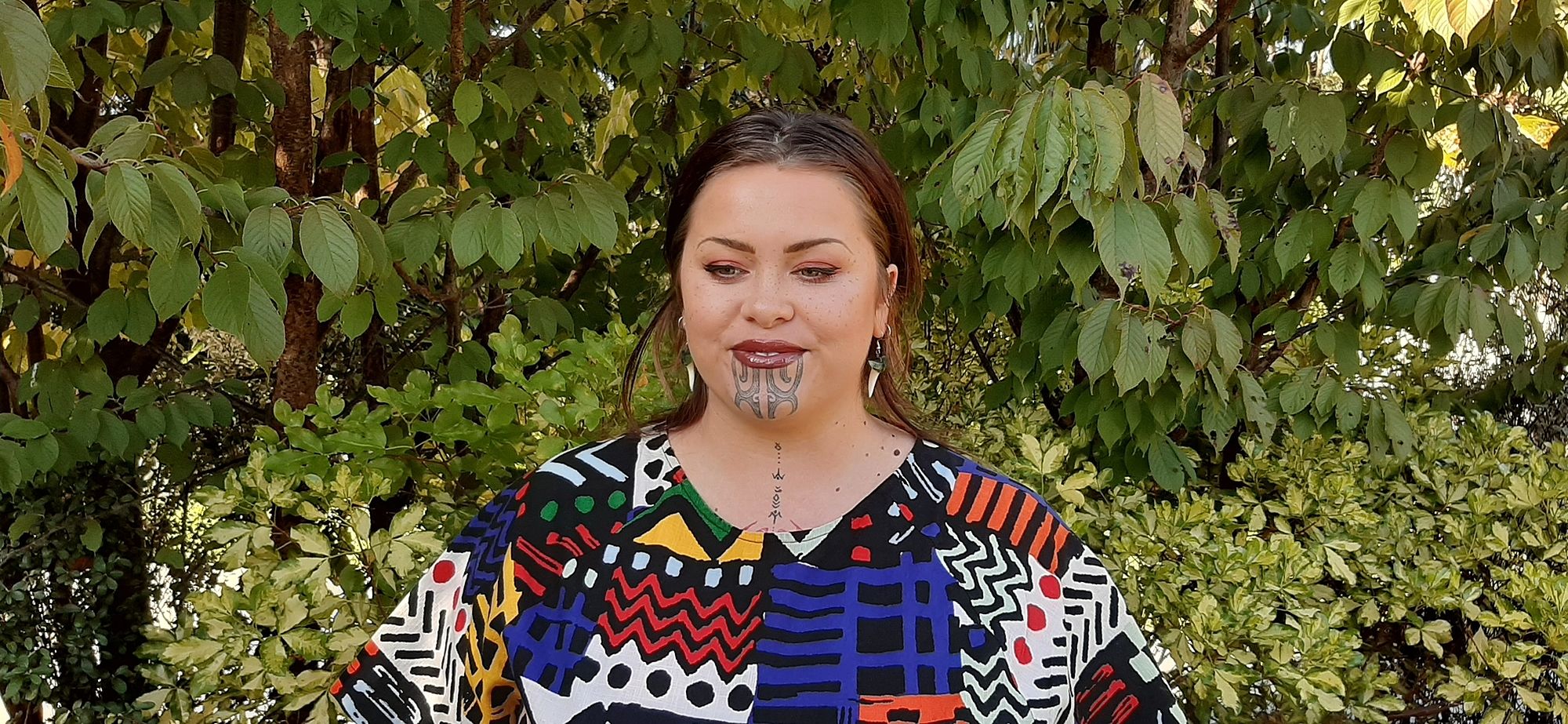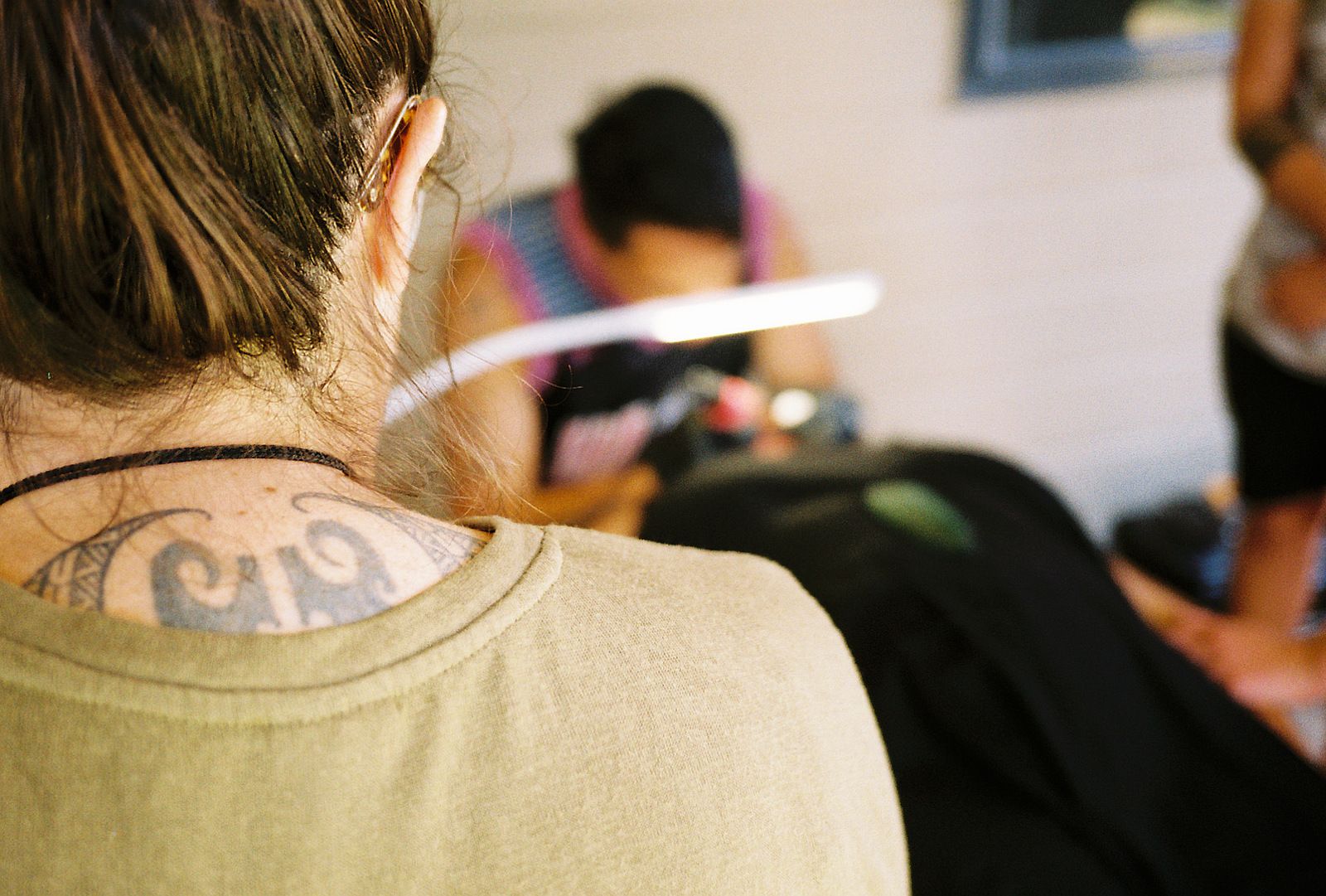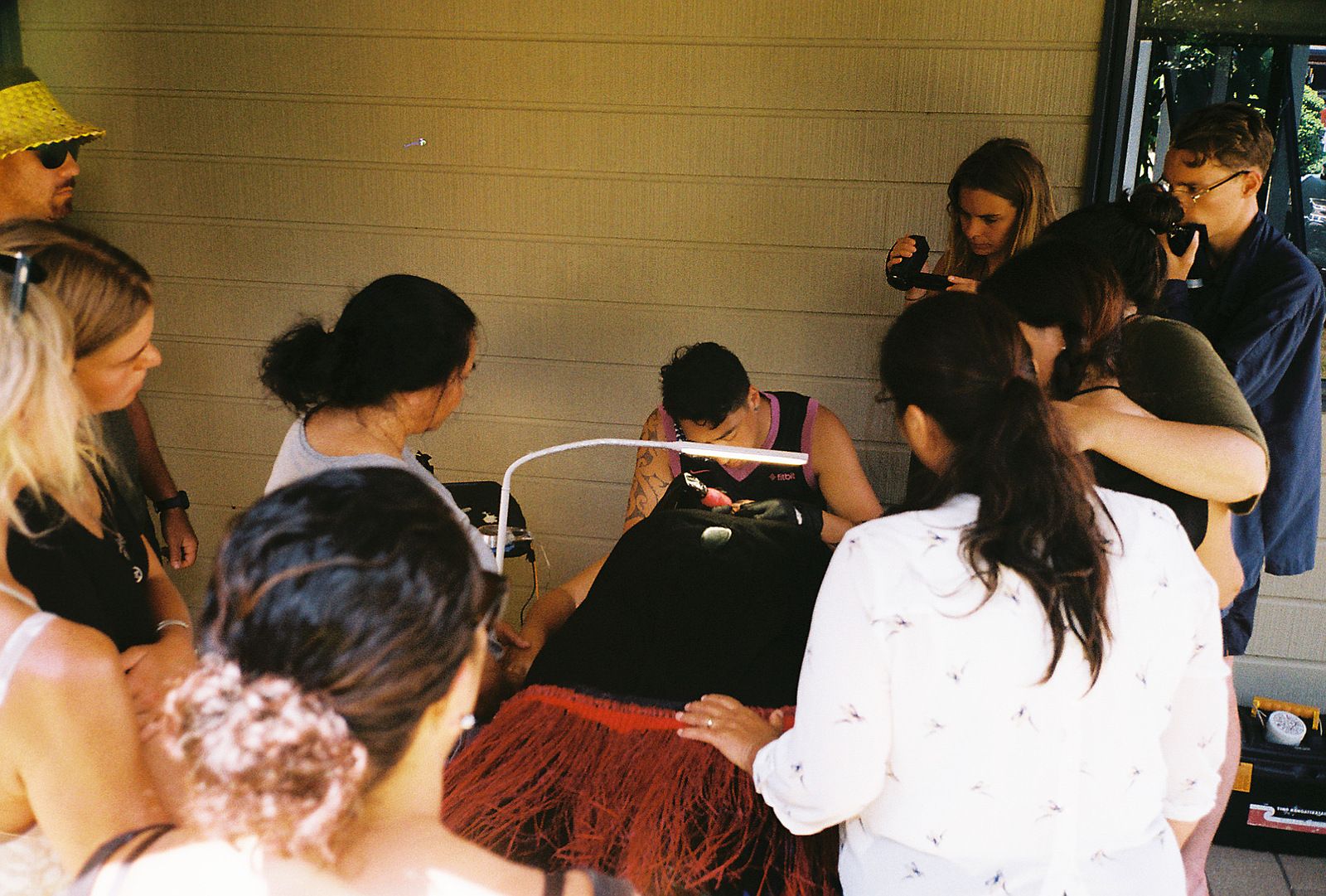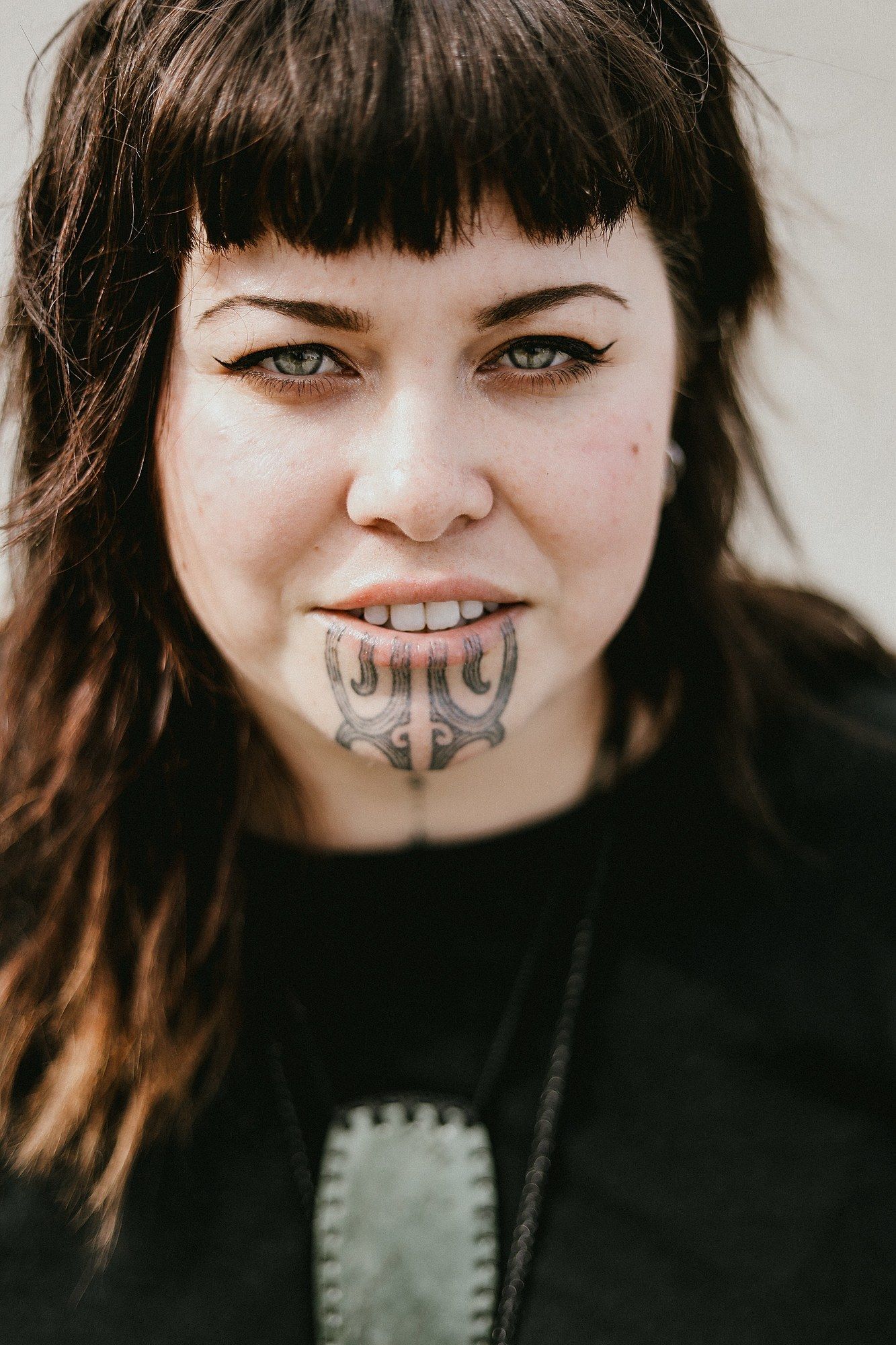We Are Worthy: Revealing My Moko Kauae
If colonisation is tearing us down and we are tearing each other down, then who is left to build us back up? Anna McAllister on revealing her moko kauae.
I remember a wahine telling me how she felt tapu in the week leading up to the reveal of her moko kauae, how she couldn't concentrate on her mahi or even drive. Eighteen nights before my moko kauae, I fought with my boyfriend. I can’t recall what it was about, but I do remember looking out at the night sky and imagining my tīpuna flying to Hawaiki, and whispering that I didn’t deserve to wear my moko kauae, that I didn’t deserve to be recognised by my tīpuna. At that moment, I told myself I would walk the earth lost and alone forever, and went to sleep with my mind made up, that tomorrow I would ring all my whānau and let them know that my moko kauae was off.
The next morning, I woke up to a feeling I had never experienced. There was a heaviness, an unusual physical weight on my body, and it was pushing me into the mattress. At the same time, my mind felt incredibly light. I was calm and relaxed, and considered that this would be a temporary thing, and gathered the strength to sit up in my bed. The sun peeked through the blinds at my parents’ house as I noticed the feeling did not leave me. My feet were being pulled down to the earth and, as my mind was pulled up to the sky, I knew. I was now tapu.
For 18 nights, I couldn’t work, and I couldn’t drive or prepare kai. To stay in this state, I performed rituals, swam in the ocean every day and rested.
I have been asked when I knew I wanted to reveal my moko kauae. I answered that I had always wanted it done. Over the past three years, I had spent time decolonising my thoughts around moko kauae, and what it meant for wāhine to wear it. Like many, I was told that to wear moko kauae you had to be a wahine of high status, older and fluent in te reo. You had to have spent a lifetime contributing to your iwi, hapu and marae. These ideas are based on the Western ideology of meritocracy, according to tā moko artist Mark Kopua and as quoted by Leonie Pihama. I picked these up over time. They were instilled in me by the odd comment by whānau or kaiako, and what I’ve seen in the media.
The knowledge I have now received and gathered tells me that wāhine received their kauae when their te awa atua first ran and, as opposed to wāhine being too paru to receive one, there were wāhine too tapu to reveal theirs. The best piece of advice I was gifted was something that I found online, and this was that colonisation was not my fault. As wāhine Māori, it is not my fault, nor yours, that our language was stolen, or that we no longer live on our whenua. If these are not our burden to carry, then why do we punish ourselves? Why do we not give ourselves permission to live life as our tīpuna did? Why do we restrict ourselves in a way that stops our culture from moving forward and impacts our lives and happiness?
I am the first in four generations to wear moko kauae; I hope that by taking this step other wāhine will follow.
After three years of relearning, my moko kauae became a recurring thought and I would look in the mirror and miss it. I knew then I needed to talk to my whānau and let them know. My sister was the easiest; she knew this was something I had been thinking about for years, and she was excited and proud of me. A tougher conversation was the one I had with my parents. My mother is Māori and Pākehā, and my father is Pākehā. My father was afraid for me and the adverse reactions I would encounter wearing my kauae in public. My mother asked about my reasoning. As a wahine Māori who has spent her life assimilating to colonial New Zealand, she struggled to understand why I would feel a desire to wear my kauae. I took the time to explain my thoughts and the reasoning behind my decision. This process took time and patience. I had to understand that this was something that had taken me years to unpack and comprehend, and they would not get it overnight.
They were both there with me in support on the day I received it and I also saw a side of my dad I had never seen before. An emotional openness, and a willingness to try things I never thought he’d be open to. A few of those I invited to attend were young Māori who would never usually experience this due to their distance from their iwi and marae. For them, the chance to be a part of such an inherently Māori experience could be formative to their own hikoi of self-discovery. These are gifts you can give to your whānau by getting your moko kauae revealed. For my whānau, I am the first in four generations to wear moko kauae; I hope that by taking this step other wāhine will follow.
As a white-passing Māori from an upper-middle-class family, I have been able to walk through life unrecognised as Māori. This was both a privilege and a curse. I got to see all the sneaky racists, the people who assumed I was Pākehā and said things to me they would never say to people they thought were Māori. But at the same time, if I didn’t open my waha, I was afforded the same respect from strangers that is gifted to Pākehā. The microaggressions that occur for brown-presenting people were not something I was affected by.
Getting my moko kauae changed all of this. I was now not only Māori but a young Māori woman with a face tattoo. I now try to move forward with a weight I had never experienced before. I am a representation of my people. When people see me, they see a Māori and may see my actions as synonymous with Māori people. This weight is something I am at times hyper-aware of. I do get looks from Pākehā, which I expected. Tourists tend not to stop staring even when you make eye contact, which can be quite funny. Most of the time I just smile, but I admit, if I’m too tired, or just grumpy, I don’t.
This look seems to me to say, “Who do YOU think YOU are to wear that?”
Older wāhine Māori sometimes give me a look I was not prepared for. This look seems to me to say, “Who do YOU think YOU are to wear that?” I find this look the most difficult because they echo the doubts I had 18 days before my moko kauae. My mother has also noticed these looks, and finds them difficult to take, herself.
I do not feel anger towards these wāhine. I understand what it must be like to be a wahine Māori who has never found her own worth to wear her kauae, and sees a young wahine, with tattoos, wearing a short skirt, and maybe doing something she disapproves of. I understand the mamae they must get when they see me. I wish I could take that away so they would know we are all worthy. Colonisation was what made it like we weren’t. But we are. We all have the right.
I understand that there will always be those who will disagree with this kaupapa. Those who still adhere to the idea of who does and doesn’t deserve to wear a moko kauae. In response, I say that if we are tearing each other down, and colonisation is tearing us down, then who is left to build us back up?



